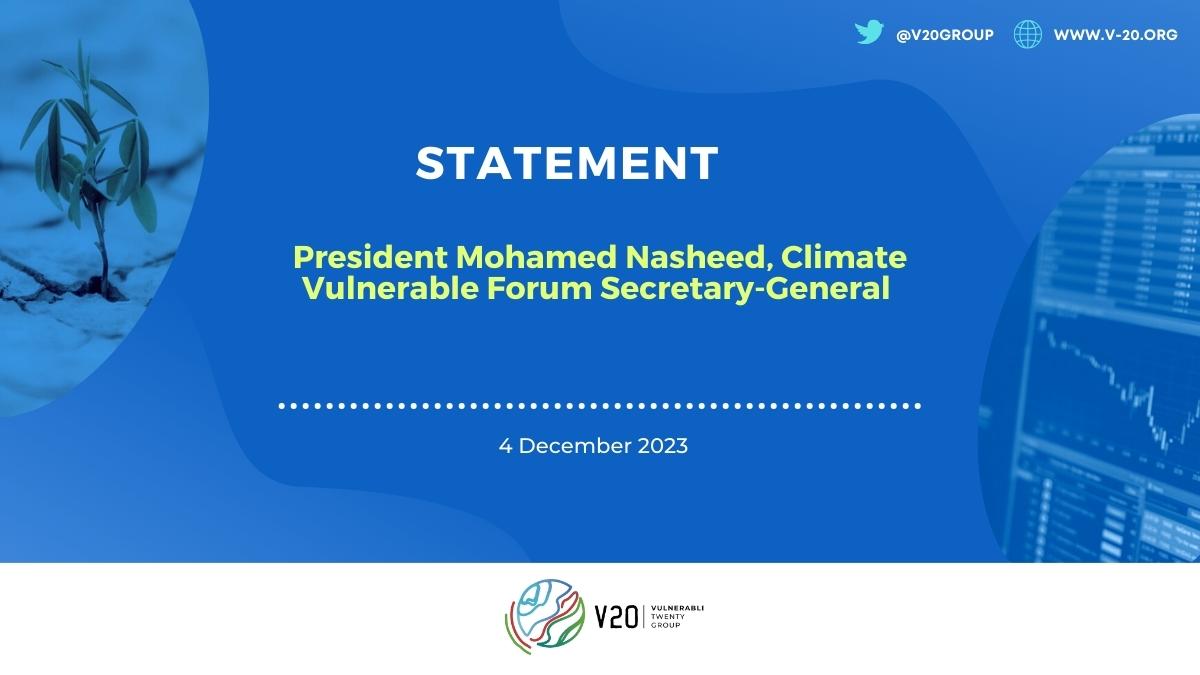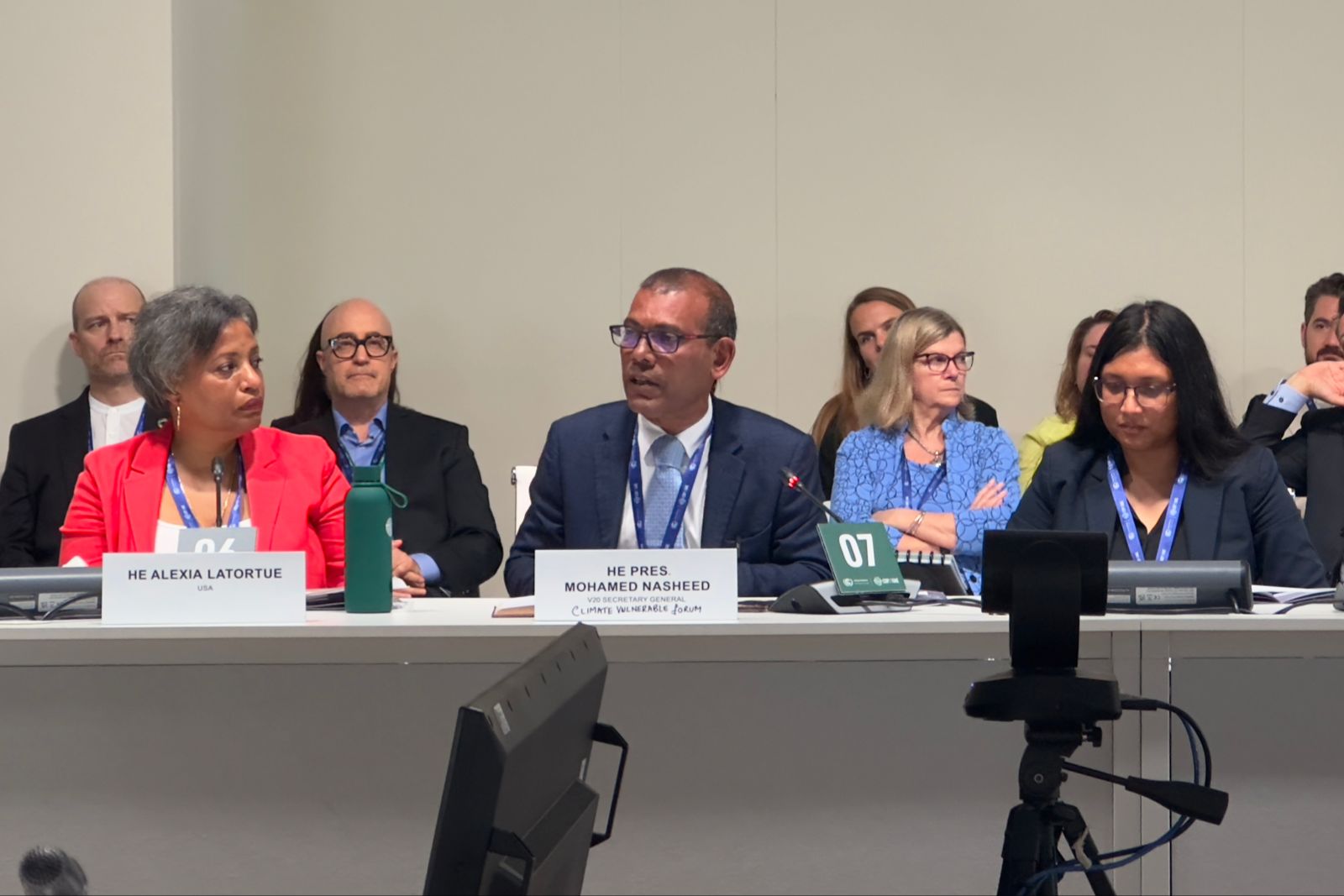President Mohamed Nasheed, Climate Vulnerable Forum Secretary-General COP28 ‘Independent High Level Expert Group on Climate Finance’ event

4 December 2023, 12 pm, GCA Action Lab, Al Shaheen, Blue Zone
Thank you to Vera Songwe, Professor Nick Stern, and to Amar Bhattacharya, for your leadership in this initiative, which is very much needed and focuses squarely on the issues of concern for us as vulnerable countries.
Since the day before yesterday I am now the incoming Secretary General of the newly independent Climate Vulnerable Forum secretariat, which will be based in Accra, Ghana and Colombo, Sri Lanka, and Prime Minister Mia Mottley is the incoming chair as the presidency moves to Barbados and she will certainly be a formidable leader for all of us. The CVF is a group that now comprises 68 countries representing 1.74 billion people, the ‘voice of the vulnerables’.
The Expert Group whose report we have heard just now is tackling what I see as the most fundamental issue facing climate today, which is ‘where is the money going to come from’. In particular, if you are asking the low emitting countries such as the CVF nations to not become big emitters, they must have a strategy for economic growth, livelihoods and prosperity which is entirely driven through a modern economy powered by clean energy and clean technology. We need to triple IDA and expand access due to climate vulnerability.
This is an issue of both justice and pragmatism. For justice, if we never become big emitters we are giving away our climate space in the carbon budget to the countries which have already used up the atmosphere. For free. The V20 ‘Fair Shares’ report found that CVF countries are already aligned with 1.5 degrees, but most developed countries are not. This is unjust, and the only recompense is if rich countries provide the finance for us to develop in a clean direction towards prosperity.
Currently we are hampered above all by the debt crisis. Our nations need urgent liquidity support or we will see more climate vulnerable countries in the kind of distress that has happened in Sri Lanka. You cannot focus on climate strategies when people do not have enough to eat, and the country is unstable. The CVF countries have 500 billion of debt coming due in the next few years. So instead of capital inflows we are seeing capital outflows, mostly to the high emitting parts of the world. As we often say in CVF, the fate of the most vulnerable will be the fate of the world.
The debt issue must be addressed, and for this we need the active participation of MDBs and also thought leadership such as from this Expert Group on creative ways forward. The World Bank’s debt pause is welcome, but must be broadened from the 45 states to include all of the climate vulnerable countries. The World Bank and IMF must integrate climate issues into its debt sustainability analysis methodology, or you are only seeing half the picture.
The Common Framework is not delivering and needs urgent overhaul. The Paris Club should lead the way in offering deeper haircuts, and countries must be granted an automatic standstill when they seek relief through the Common Framework to encourage them to participate.
The CVF countries are not just victims in the climate picture. We plan for climate prosperity, and have a program of Climate Prosperity Plans, which are already underway in several countries. These plans outline at the project level the investments needed in different sectors, from energy to transport to agriculture. Ghana, Sri Lanka, Bangladesh have already completed Climate Prosperity Plans, and more are underway.
We estimate there is a $10 trillion investment need for CVF countries for the remainder of this decade. We have been thinking about how we can work with MDBs and others towards a new asset class of de-risked bonds which bundle investment in CVF countries in a way which lowers the cost of capital and raises this $10 trillion. We have a concept note on this I would be happy to share with you.
I was very interested to see the World Bank has begun thinking along similar lines, with a securitizable asset class of investments where large pension funds and other capital providers will find attractive places to invest. We need to move quickly from billions to trillions in this conversation and we need to ensure that CVF countries are not locked out of investment flows because of debt and the high cost of capital.
To conclude, I can assure you today CVF member countries do not want high-carbon development. But development itself is non negotiable. We will not trade off poverty for climate stability. And clean development will need the world to pay serious attention to the investment needs of the climate vulnerables. Many of you here are leading this conversation, and I stand ready to engage with you. We cannot have 1.7 billion people in this room, but the voices of the vulnerables must always be heard.
Thank you.


